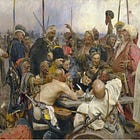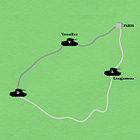Between 1919 and 1935, the mobilized ground forces of any one of the many states hostile to Germany - let alone a coalition of two or three - greatly outnumbered the tiny professional army of the Weimar Republic. As a result, senior German soldiers could not imagine a scenario in which they could conduct decision-seeking operations on a national scale. Rather, the best that they could hope for was a series of inherently indecisive actions that would prevent defeat long enough for an external power to rescue the hard-pressed Reich.
For years, German plans to conduct delaying resistance represented less of a reflection of the maneuver warfare tradition than a variation thereof. A few days ago, however, I realized that I had been wrong. In the course of engaging a sketch of delaying resistance written by a German soldier in the 1920s, I found myself thinking that, over the past thirty months, the successes enjoyed by the armed forces of Ukraine have owed much to operations that resemble those imagined by German soldiers of the interwar period. Similarly, I noticed that the great defeats suffered by Ukrainian formations took place when their actions ran contrary to the logic of delaying resistance.
Neither the Kherson offensive of the summer of 2023, the Kharkiv offensive that followed on its heels, and the ongoing incursion southwest of Kursk achieved decisive effects. That is, none of them destroyed a significant part of the Russian forces involved in the conflict. Nonetheless, they provided the bankers, backers, and boosters of the government in Kyiv with proof of low-cost, photogenic progress. In much the same way, attempts to achieve decisive results against well-fortified forces that enjoy a ten-fold advantage in artillery have wrought nothing more than expensive, undeniable defeat.
I am not such a fool as to offer, from the safety of my cozy office in the Old Headquarters Building, with no real worries save those caused by the neuroses of my cats, advice to people involved in a shooting war. I do, however, have something to say about my fellow commentators. Pace Simplicius the Thinker, dean of the Z-Bloggers, the Ukrainian incursion in the direction of Kursk is no ‘aimless light cavalry raid’. It may lack a Schwerpunkt, but it serves the logic of delaying resistance. At the same time, pundits who characterize the event as a restoration of operational maneuver betray their ignorance of the meaning of both operational and maneuver, at least as understood by devotés of the tradition of maneuver warfare. (See above, under Schwerpunkt.)
For Further Reading:













Paragraph 3 says it all perfectly. One wonders at the next act in this Greek tragedy, one could guess Russian Federation forces in the east west axis are straightening up their lines in preparation for the next phase. Might the RF forces just 18 klicks north of Kharkiv be readying for their next phase of the fight? Another grinding push from east to west, a fast break from north to south? Kursk? What tragic use of forces, for some “ photogenic” use to imply that Ukraine is still capable of sustained offensive action. One can guess that won’t end well either.